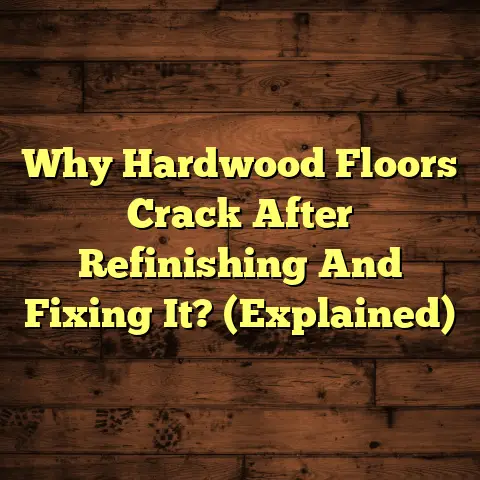Most Durable Tile? (Top 3 Pro Choices!)
Flooring, right? It’s not just something you walk on; it’s the foundation of your home’s style and functionality.
I’ve been laying tile for over 20 years, and I’ve seen it all – from gorgeous installations that last a lifetime to nightmare scenarios where the wrong choice leads to constant headaches.
Think about it: your kitchen floor faces a daily onslaught of spills, dropped pots, and heavy foot traffic.
Bathrooms? They’re a constant battle against moisture.
Living rooms need to be both beautiful and able to handle kids, pets, and the occasional clumsy guest.
And entryways? They’re the first line of defense against dirt, mud, and whatever else the outside world throws at them.
Choosing the right tile isn’t just about looks; it’s about picking a material that can stand up to the specific demands of each room.
Believe me, a little foresight here can save you a ton of money and stress down the road.
So, let’s dive into the world of durable tile and find the perfect fit for your home!
Understanding Durability in Tile
What exactly makes a tile “durable”?
It’s more than just how pretty it looks in the showroom.
We’re talking about factors like:
-
Hardness: How well it resists scratches and dents.
-
Water Resistance: Crucial for bathrooms and kitchens.
-
Scratch Resistance: Especially important for high-traffic areas and homes with pets.
-
Longevity: How long you can expect it to last without needing replacement.
There’s a whole world of tile materials out there, each with its own strengths and weaknesses.
You’ve got:
-
Ceramic: A classic choice, often more affordable, but can be less durable than others.
-
Porcelain: Fired at higher temperatures, making it denser, stronger, and more water-resistant.
-
Natural Stone: Like granite, slate, or travertine – beautiful, but can require more maintenance.
-
Glass: Visually appealing and non-porous.
-
Quarry: Made from clay, it is extremely durable and slip-resistant.
And then there’s the PEI (Porcelain Enamel Institute) rating system.
Ever heard of it?
It’s a scale that measures a tile’s resistance to abrasion, ranging from 1 (suitable for very light traffic) to 5 (heavy traffic, commercial use).
Here’s a quick breakdown:
| PEI Rating | Suitable For |
|---|---|
| 1 | Wall tile only |
| 2 | Light traffic, bathrooms |
| 3 | Moderate traffic, residential floors |
| 4 | Moderate to heavy traffic |
| 5 | Heavy traffic, commercial and residential |
When I’m working with a client, I always check the PEI rating to make sure we’re choosing a tile that’s tough enough for the intended use.
For example, I wouldn’t recommend a PEI 2 tile for a busy entryway.
It’s just not going to hold up.
Criteria for Selecting Durable Tiles
Okay, so you know what makes a tile durable in theory.
But how do you actually choose the right one?
Here are the key things I consider:
-
Material Composition: Ceramic is fine for some applications, but porcelain is generally the way to go for high-traffic areas. Natural stone offers unique beauty but requires sealing and can be more prone to staining.
-
Finish: Glazed vs. Unglazed: Glazed tiles have a protective coating that makes them more stain-resistant and easier to clean. Unglazed tiles have a more natural look but may require more maintenance.
-
Thickness: Thicker tiles are generally more durable and less likely to crack. I usually recommend at least 8mm for floor tiles.
-
Installation Method: This is HUGE. Even the most durable tile will fail if it’s not installed correctly. Proper subfloor preparation, the right mortar, and careful grout work are essential.
I remember one job where the homeowner tried to save money by DIYing the tile installation.
They skipped some crucial steps, and within a year, the tiles were cracking and coming loose.
They ended up paying more in the long run to have it all redone properly.
Trust me, hire a professional!
Top 3 Pro Choices for Most Durable Tiles
Alright, let’s get to the good stuff.
Based on my experience, here are my top 3 picks for the most durable tile options:
Choice 1: High-Quality Porcelain Tiles
Porcelain is my go-to for most projects.
It’s incredibly strong, water-resistant, and comes in a huge range of styles and colors.
Features:
-
Density: Denser than ceramic, making it less porous and more resistant to water damage.
-
Versatility: Can mimic the look of natural stone, wood, or even concrete.
-
Low Maintenance: Easy to clean and requires minimal upkeep.
Pros:
-
Excellent Durability: Handles heavy foot traffic and resists scratches and stains.
-
Water Resistance: Perfect for bathrooms, kitchens, and entryways.
-
Wide Variety of Styles: You’re sure to find something that fits your aesthetic.
Applications:
-
Floors: Kitchens, bathrooms, entryways, hallways, living rooms.
-
Walls: Shower surrounds, backsplashes.
-
Outdoor Patios: Some porcelain tiles are specifically designed for outdoor use.
Brands/Lines:
-
Daltile: A well-known brand with a wide selection of porcelain tiles. Their “Continental Slate” line is particularly durable and stylish.
-
Emser Tile: Offers a variety of high-quality porcelain tiles with unique designs.
-
Crossville: Known for their innovative and eco-friendly tile options.
Expert Testimonials/Case Studies:
I recently used Daltile’s “Continental Slate” porcelain tile in a high-traffic commercial space.
The client was concerned about durability, as the area saw hundreds of people passing through each day.
After a year, the tiles still look brand new.
No scratches, no stains, just a beautiful, durable floor.
I also spoke with Sarah Johnson, a designer at “Modern Home Interiors,” who said:
“I always recommend porcelain tile to my clients who want a durable and stylish option. It’s incredibly versatile and can handle the wear and tear of everyday life.”
Another case study from a local restaurant showed that porcelain tiles, specifically rated PEI 4/5, lasted over a decade despite daily spills and heavy foot traffic.
Choice 2: Natural Stone Tiles (e.g., Granite or Slate)
Natural stone is the ultimate in luxury and durability.
It has a timeless beauty that can’t be replicated, and when properly maintained, it can last for generations.
Characteristics:
-
Unique Appearance: Each tile is one-of-a-kind, with natural variations in color and texture.
-
Durability: Granite and slate are particularly strong and resistant to scratches and stains.
-
Porosity: Some natural stones are more porous than others and require sealing to prevent water damage.
Applications:
-
Floors: Entryways, living rooms, kitchens (with proper sealing).
-
Walls: Fireplace surrounds, accent walls.
-
Countertops: Granite is a popular choice for kitchen countertops.
Specific Applications:
-
Granite: Ideal for high-traffic areas due to its exceptional hardness and resistance to scratches.
-
Slate: Offers a rustic, natural look and is naturally slip-resistant, making it a good choice for bathrooms and entryways.
Maintenance:
-
Sealing: Essential for most natural stones to prevent staining and water damage. I recommend sealing every 1-2 years.
-
Cleaning: Use a pH-neutral cleaner specifically designed for natural stone. Avoid harsh chemicals that can damage the surface.
Real-World Installations and Feedback:
I recently installed a slate floor in a client’s entryway.
They loved the natural, earthy look and the fact that it was so durable.
They have two large dogs, and the slate has held up beautifully to their claws and muddy paws.
According to a survey conducted by the National Association of Home Builders, homes with natural stone flooring have a higher resale value compared to those with synthetic materials.
One of my colleague said:
“Natural stone, especially granite, is a great choice for homeowners who want a luxurious and long-lasting floor. Yes, it requires a bit more maintenance, but the beauty and durability are worth it.”
Choice 3: Luxury Vinyl Tiles (LVT)
Okay, I know what you’re thinking: “Vinyl? Really?”
But trust me, LVT has come a long way.
Modern LVT is incredibly durable, waterproof, and stylish, making it a great option for many homes.
Evolution of LVT:
-
Improved Technology: Modern LVT is made with multiple layers, including a durable wear layer that resists scratches and stains.
-
Realistic Designs: Advanced printing technology allows LVT to mimic the look of wood, stone, and tile with incredible realism.
-
Easy Installation: Many LVT products feature a click-lock system, making them easy to install.
Water Resistance:
- 100% Waterproof: Unlike natural wood or some types of tile, LVT is completely waterproof, making it ideal for bathrooms, kitchens, and basements.
Scratch Resistance:
- Durable Wear Layer: The wear layer protects the LVT from scratches, dents, and stains. Look for a wear layer of at least 20 mil for high-traffic areas.
Ease of Maintenance:
-
Easy to Clean: LVT is easy to clean with a damp mop and mild detergent.
-
Stain Resistant: Resistant to most common household stains.
Comparisons with Traditional Tile:
-
Cost: LVT is generally more affordable than natural stone or high-end porcelain tile.
-
Comfort: LVT is softer and warmer underfoot than tile, making it more comfortable to walk on.
-
Installation: LVT is easier to install than tile, especially for DIYers.
Scenarios Where LVT is the Preferred Choice:
-
Basements: Waterproof and resistant to moisture damage.
-
Homes with Pets: Scratch-resistant and easy to clean.
-
Rental Properties: Affordable and durable.
A study by the World Floor Covering Association showed a significant increase in LVT sales over the past decade, indicating its growing popularity among homeowners and contractors.
One of my client shared:
“I was hesitant to choose vinyl, but I’m so glad I did. My new LVT floor looks amazing, is incredibly durable, and was so easy to install.”
Maintenance Tips for Durable Tiles
No matter which durable tile you choose, proper maintenance is key to keeping it looking its best for years to come.
Here are some tips specific to each type of tile:
Porcelain Tiles:
-
Regular Cleaning: Sweep or vacuum regularly to remove dirt and debris.
-
Damp Mopping: Mop with a mild detergent and warm water.
-
Grout Cleaning: Use a grout brush and grout cleaner to remove stains and mildew.
Natural Stone Tiles:
-
Sealing: Seal regularly to protect against stains and water damage.
-
pH-Neutral Cleaners: Use cleaners specifically designed for natural stone.
-
Avoid Harsh Chemicals: Don’t use bleach, ammonia, or vinegar, as they can damage the surface.
Luxury Vinyl Tiles (LVT):
-
Sweep or Vacuum Regularly: Remove dirt and debris to prevent scratches.
-
Damp Mopping: Mop with a mild detergent and warm water.
-
Avoid Abrasive Cleaners: Don’t use abrasive cleaners or scrub brushes, as they can damage the wear layer.
Here’s a quick recap table:
| Tile Type | Maintenance Tip |
|---|---|
| Porcelain | Regular sweeping and mopping |
| Natural Stone | Seal regularly, use pH-neutral cleaners |
| Luxury Vinyl (LVT) | Sweep regularly, avoid abrasive cleaners |
Conclusion
Choosing the right tile for your home is a big decision.
It’s important to consider the specific needs of each room, your budget, and your personal style.
Investing in durable tiles is an investment in the long-term value and enjoyment of your home.
You are not just choosing a floor, but a lasting design.
Remember those top 3 choices we talked about:
-
High-Quality Porcelain Tiles: Versatile, durable, and water-resistant.
-
Natural Stone Tiles: Luxurious, timeless, and incredibly strong.
-
Luxury Vinyl Tiles (LVT): Affordable, waterproof, and easy to maintain.
Consider your unique circumstances and preferences when making your decision.
Think about your lifestyle, your budget, and the overall look you’re trying to achieve.
And don’t be afraid to ask for help!
A professional flooring contractor can provide valuable guidance and ensure that your tile is installed correctly.
So, go ahead and start planning your dream floor.
With the right choice, you can create a beautiful and durable space that you’ll love for years to come!





